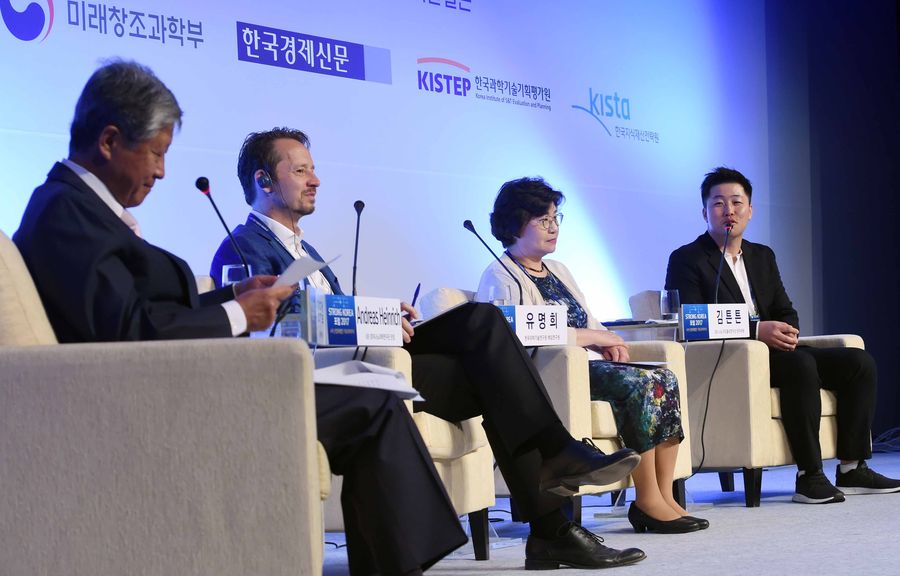주메뉴
- About IBS 연구원소개
-
Research Centers
연구단소개
- Research Outcomes
- Mathematics
- Physics
- Center for Theoretical Physics of the Universe(Particle Theory and Cosmology Group)
- Center for Theoretical Physics of the Universe(Cosmology, Gravity and Astroparticle Physics Group)
- Center for Exotic Nuclear Studies
- Center for Artificial Low Dimensional Electronic Systems
- Center for Underground Physics
- Center for Axion and Precision Physics Research
- Center for Theoretical Physics of Complex Systems
- Center for Quantum Nanoscience
- Center for Van der Waals Quantum Solids
- Chemistry
- Life Sciences
- Earth Science
- Interdisciplinary
- Center for Neuroscience Imaging Research(Neuro Technology Group)
- Center for Neuroscience Imaging Research(Cognitive and Computational Neuroscience Group)
- Center for Algorithmic and Robotized Synthesis
- Center for Genome Engineering
- Center for Nanomedicine
- Center for Biomolecular and Cellular Structure
- Center for 2D Quantum Heterostructures
- Center for Quantum Conversion Research
- Institutes
- Korea Virus Research Institute
- News Center 뉴스 센터
- Career 인재초빙
- Living in Korea IBS School-UST
- IBS School 윤리경영


주메뉴
- About IBS
-
Research Centers
- Research Outcomes
- Mathematics
- Physics
- Center for Theoretical Physics of the Universe(Particle Theory and Cosmology Group)
- Center for Theoretical Physics of the Universe(Cosmology, Gravity and Astroparticle Physics Group)
- Center for Exotic Nuclear Studies
- Center for Artificial Low Dimensional Electronic Systems
- Center for Underground Physics
- Center for Axion and Precision Physics Research
- Center for Theoretical Physics of Complex Systems
- Center for Quantum Nanoscience
- Center for Van der Waals Quantum Solids
- Chemistry
- Life Sciences
- Earth Science
- Interdisciplinary
- Center for Neuroscience Imaging Research(Neuro Technology Group)
- Center for Neuroscience Imaging Research(Cognitive and Computational Neuroscience Group)
- Center for Algorithmic and Robotized Synthesis
- Center for Genome Engineering
- Center for Nanomedicine
- Center for Biomolecular and Cellular Structure
- Center for 2D Quantum Heterostructures
- Center for Quantum Conversion Research
- Institutes
- Korea Virus Research Institute
- News Center
- Career
- Living in Korea
- IBS School
News Center
| Title | The Fourth Industrial Revolution Begins with Basic Science | ||||
|---|---|---|---|---|---|
| Name | Department of Communications | Registration Date | 2017-06-05 | Hits | 5295 |
| att. |
 thumb.jpg
thumb.jpg
|
||||
The Fourth Industrial Revolution Begins with Basic Science- Setting up the foundations of a competitive country at the Strong Korea 2017 Forum - From the acronym Science Technology Research is Our National Goal, the 'STRONG Korea' campaign clearly defines Korea's mission to establish itself as a powerhouse in the scientific field. As basic science is seen as a foundation for this development, members of the Institute for Basic Science (IBS) took part to the well-attended Strong Korea 2017 on June 1st. The event organized by the Korea Economic Daily and the Ministry of Science, ICT and Future Planning provided a venue to discuss the current potentials and challenges facing the country to strengthen national competitiveness, develop creative talents, and guide science policy and education.
The session about basic science "Fostering the top next-generation scientists" was opened by IBS President KIM Doochul and included three speakers: the recently appointed director of the IBS Center for Quantum Nanoscience Andreas Heinrich, principal researcher at the Korea Institute of Science and Technology (KIST) YU Myeong-Hee, and IBS Young Scientists Fellow KIM Teun-Teun. Basic science is the accumulation of human knowledge driven by our natural curiosity to understand how the universe works. It does not show immediate or short-term effects and requires a steady investment; therefore its importance is often discussed, especially during times of austerity and financial difficulties. By funding IBS, the Korean government has trusted in the significance of basic science and the relevance of growing top-level scientists. Andreas Heinrich set up by explaining his view on how world-class research labs have been created. He chose to establish his lab in Korea because "IBS provides the greatest package to perform basic science research in the world." He explained his mission to build up an international environment for scientists with an upside down organizational chart, that is non-hierarchical. He also wishes to promote the role of women in science and technology, and communicate his scientific results to the broader society. He also stressed the relevance of nurturing curiosity of the youth by creating an education system that is investigation-driven. The construction of the building that will host the Center for Quantum Nanoscience will begin this summer at Ewha Womans University in Seoul. YU Myeong-Hee illustrated which changes need overcoming to advance the Korean science and technology sectors. By introducing the results of a recently published paper (Li et al, Science 2017), she pointed out that publicly funded science builds the foundation for private-sector commercial patents and marketed products. She stressed the need for revolutionary, interdisciplinary, and people-based research: "What is really needed in the fourth industrial revolution, is to secure outstanding research and development results worth the investment. It is therefore necessary to shift to a high-risk, high-value research structure based on autonomy and creativity." Then, KIM Teun-Teun, winner of the IBS Young Scientists Fellowship to work at the IBS Center for Integrated Nanostructure Physics, presented the difficulties faced by young scientists to follow their dream of becoming scientists. By explaining how his passion for science and grit drove him through his career pathway, he introduced which highly-competitive career development programs are available for early career researchers in Europe and Korea. The forum continued with talks about transformative concepts at the heart of the fourth industrial revolution, such as 3D virtual platforms, internet of things (IoT), and society-centered technologies that promise to benefit the Korean economy at the speed of tomorrow. |
|||||
| Next | |
|---|---|
| before |
- Content Manager
- Public Relations Team : Yim Ji Yeob 042-878-8173
- Last Update 2023-11-28 14:20












